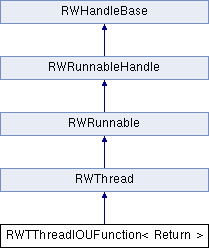SourcePro® 2023.1 |
SourcePro® API Reference Guide |
SourcePro® 2023.1 |
SourcePro® API Reference Guide |
Handle class for functor-based threaded runnable objects. More...
#include <rw/thread/RWTThreadIOUFunction.h>

Static Public Member Functions | |
| static RWTThreadIOUFunction< Return > | make () |
| static RWTThreadIOUFunction< Return > | make (const RWTFunctor< Return()> &functor) |
| static RWTThreadIOUFunction< Return > | make (const RWTIOUEscrow< Return > &escrow, const RWTFunctor< Return()> &functor) |
| static RWTThreadIOUFunction< Return > | make (const RWTFunctor< Return()> &functor, const RWThreadAttribute &attr) |
| static RWTThreadIOUFunction< Return > | make (const RWTIOUEscrow< Return > &escrow, const RWTFunctor< Return()> &functor, const RWThreadAttribute &attr) |
 Static Public Member Functions inherited from RWThread Static Public Member Functions inherited from RWThread | |
| static bool | canGetMaxThreads () |
| static bool | canSuspendResume () |
| static size_t | getMaxThreads () |
Additional Inherited Members | |
 Protected Member Functions inherited from RWThread Protected Member Functions inherited from RWThread | |
| RWThread (RWThreadImp *threadImpP) | |
 Protected Member Functions inherited from RWRunnable Protected Member Functions inherited from RWRunnable | |
| RWRunnable (const RWRunnableSelf &second) | |
 Protected Member Functions inherited from RWRunnableHandle Protected Member Functions inherited from RWRunnableHandle | |
| RWRunnableHandle () | |
| RWRunnableHandle (RWStaticCtor) | |
| RWRunnableHandle (RWRunnableImp *runnableImpP) | |
| RWRunnableHandle (const RWRunnableHandle &second) | |
| ~RWRunnableHandle () | |
| RWRunnableHandle & | operator= (const RWRunnableHandle &second) |
 Protected Member Functions inherited from RWHandleBase Protected Member Functions inherited from RWHandleBase | |
| RWHandleBase (void) | |
| RWHandleBase (RWStaticCtor) | |
| RWHandleBase (RWBodyBase *body) | |
| RWHandleBase (const RWHandleBase &second) | |
| ~RWHandleBase (void) | |
| RWBodyBase & | body (void) const |
| RWHandleBase & | operator= (const RWHandleBase &second) |
The RWTThreadIOUFunction class is a handle class for functor-based threaded runnable objects.
A runnable object provides the basic mechanisms used to create, control, and monitor the threads of execution within your application. Runnables are used to define the task or activity to be performed by a thread.
Each runnable object is reference-counted. A threaded runnable body instance keeps a count of the number of handles that currently reference it. A runnable object is deleted when the last handle that references the body is deleted.
A functor-based runnable accepts a functor object for execution. A functor is an object used to encapsulate a function call. Each functor keeps a pointer to the function and copies of the argument values that are to be passed to the function. Invoking a functor produces a call to the function, and in this case, a return value.
A functor-based runnable simply redefines the basic run() member to invoke a functor instance stored within the runnable. With this capability, you do not have to resort to sub-classing or other intrusive techniques to customize the execution behavior of a runnable. The functor-based runnables allow you to dynamically specify the functions you want to execute when a runnable is started.
RWTThreadIOUFunction is used to access a threaded runnable, which creates a new thread to execute the specified functor. The result of the functor is returned in the form of an IOU. An IOU may be obtained as soon as the runnable is created. To get the actual result from the IOU you must redeem it. If the result has not yet been calculated, the calling thread blocks until it has.
OUTPUT:
|
inline |
Constructs an empty RWTThreadIOUFunction handle instance.
|
inline |
Binds a new handle to the runnable instance, if any, pointed to by the handle second.
|
inline |
Destructor.
| RWTFunctor<Return()> RWTThreadIOUFunction< Return >::getFunctor | ( | ) | const |
Gets the current functor instance, if any, associated with the runnable. Possible exceptions include RWTHRInvalidPointer and RWTHRInternalError.
|
static |
Constructs and returns an RWTThreadIOUFunction object with an undefined functor. The setFunctor() member must be used to define a functor prior to starting.
|
static |
Constructs and returns an RWTThreadIOUFunction that executes the specified functor when started.
|
static |
Constructs and returns an RWTThreadIOUFunction that executes the specified functor when started, and places the functor result in escrow.
|
static |
Constructs and returns an RWTThreadIOUFunction that executes the specified functor when started. A new thread is created using the attributes given by attr.
|
static |
Constructs and returns an RWTThreadIOUFunction that executes the specified functor when started. A new thread is created using the attributes given by attr, and the functor result is stored in escrow.
| RWTIOUResult<Return> RWTThreadIOUFunction< Return >::operator() | ( | ) | const |
Returns the IOU that will receive the result of the function.
|
inline |
Binds this to the runnable instance, if any, pointed to by the handle second.
| RWTIOUResult<Return> RWTThreadIOUFunction< Return >::result | ( | ) | const |
Returns the IOU that will receive the result of the function.
| void RWTThreadIOUFunction< Return >::setFunctor | ( | const RWTFunctor< Return()> & | functor | ) |
Sets the functor to be executed by this runnable. Possible exceptions include RWTHRInvalidPointer and RWTHRInternalError.
| void RWTThreadIOUFunction< Return >::setIOUEscrow | ( | const RWTIOUEscrow< Return > & | escrow | ) |
Specifies an IOU escrow that is to receive the result of the function. The new IOU is not used until the next time start() is called. Each time an RWTThreadIOUFunction object is restarted, it checks its current IOU escrow handle to see if it is valid, and if so, checks to see whether the escrow has already been used to capture a result or exception, or has been aborted. If the escrow object is found to be in any of these "redeemable" states, a new escrow instance is automatically created to capture the next result. Possible exceptions include RWTHRInvalidPointer and RWTHRInternalError.
|
Copyright © 2023 Rogue Wave Software, Inc., a Perforce company. All Rights Reserved. |